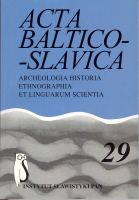К этимологии некотрых древнерусских ойконимов XIV-XVII вв. с основами балтийского происхождения
About the etymology of specific manuscript old-Russian oikonyms of the XIV-XVII centuries with the stems of the Baltic origin
Author(s): Maksim A. JujukinSubject(s): Language and Literature Studies
Published by: Instytut Slawistyki Polskiej Akademii Nauk
Keywords: old Russian language; Slavic languages; Baltic languages; toponym; oikonym; hydronym; anthroponomy; etymology
Summary/Abstract: In the article etymologies of some Old Russian place-names with stems of the Baltic origin, mentioned in chronicles in 14th-17th centuries, are considered. By the side of names, Baltic sources of which stems are more or less clear (Вевереск, Боры, Гертен, Демен, Истерва, Истья, Корнике, (Корники), Кушель), there are toponyms that may be explained from both Baltic and Slavonic languages with the equal degree of reliability (Болки, Дегунино, Куней, Оболчи). Their double etymologies are due to both the genetic relationship between these groups of languages and their close interaction in the toponymical system of the area these names are located in: the North-West of Russia, the basin of Oka and Upper Volga. They are derived from stems belonging to various lexical groups: apellatives, hydronyms, anthroponyms. In the structural aspect place-names present lexico-semantic, morphological and grammatical procedures of toponymical word-formation.
Journal: Acta Baltico Slavica
- Issue Year: 2005
- Issue No: 29
- Page Range: 39-45
- Page Count: 7
- Language: Russian

